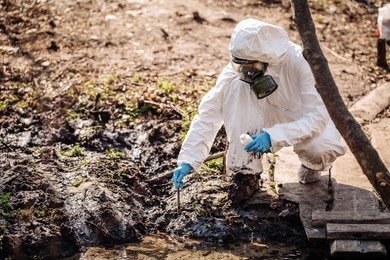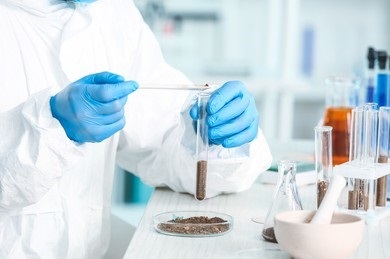
Soil provides a valuable natural environment and material resources for the survival of humans, animals, and plants. In recent years, with the rapid development of global industrialization and urbanization, the soil has been continuously polluted by heavy metals, pesticides, organic matter, and electronic waste, resulting in serious direct economic losses.
In addition, soil pollution can cause pollutants to accumulate in crops and enrich human and animal bodies through the food chain, endangering human and animal health, causing cancer and other diseases, etc. Contaminated topsoil also easily enters the atmosphere and water bodies under the action of wind and water forces, leading to other ecological problems such as atmospheric pollution, surface water pollution, groundwater pollution, and ecosystem degradation.

Lifeasible provides a total solution for soil residue and contaminant detection, not only by simply following the standard method to form an experimental report but also by optimizing the complete process of sample pre-treatment, instrument tuning, sample making, interference elimination and result in analysis, quality control, etc., to achieve efficient, reliable, easy and friendly results. In addition, Lifeasible will provide professional soil testing services according to your needs and independent analysis for different soil qualities based on a wide range of environmental parameters to provide you with real and reliable testing data.
Soil contaminant testing can determine the contamination status of the soil. Lifeasible offers tests for heavy metals, pesticide residues, and other organic contaminants (organochlorine pesticides, organophosphorus pesticides, carbamate pesticides, polycyclic aromatic hydrocarbons, phenolic compounds, nitrobenzene compounds, aniline compounds, phthalic acid, etc.), organic, inorganic, and radioactive contaminants, etc.
| Projects | Description |
| Pesticide residues testing | Lifeasible uses a variety of analytical techniques to detect tens of thousands of pesticide residues in soil, including organochlorines, organophosphates, carbamates, pyrethroids, heterocyclic compounds, others (phenoxy carboxylic acids, urea compounds), etc. |
| Soil metal testing | The main detection methods used by Lifeasible in soil heavy metal detection include chemical analysis, optical analysis, electrochemical analysis, chromatography, atomic absorption, chemiluminescence, etc. |
| Soil organic pollutants testing | Lifeasible can detect soil organic pollutant species including benzene, toluene, xylene, ethylbenzene, trichloroethylene, and other volatile organic pollutants, as well as polycyclic aromatic hydrocarbons, polychlorinated biphenyls, organic pesticides, and other semi-volatile organic pollutants. |
| Soil inorganic pollutants testing | Lifeasible can detect soil inorganic pollutants including various acids, bases, salt compounds, heavy metals, compounds containing arsenic, selenium, fluorine, etc. |
| Stable isotope testing | Lifeasible relies on advanced instrumentation and proven systems for stable isotope (e.g., 13C, 15N, 18O, 2H, 34S, etc.) and its elemental content testing services. |
Lifeasible provides total solutions for soil residue and contaminant testing, including pesticide residue testing, soil metal testing, organic and inorganic contaminant testing, radioactivity testing, etc. We offer a wide range of testing methods and applications. Please contact our staff for the latest quotation.